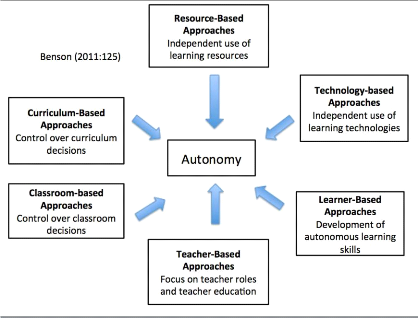I-Literature review on learner autonomy in
education
How far one wants to go in encouraging autonomy, he suggested,
`will be dictated by the contexts and environments in which the teaching and
learning takes place'. Littlewood (1999:75) also argued that although for many
writers `proactive autonomy is the only kind that counts', reactive autonomy
had its place either as a step towards proactive autonomy, or as a goal in its
own right. One problem with such models, however, is their assumption that the
relationship between the development of autonomy and language proficiency is
unproblematic.
Kumaravadivelu (2003: 144) has argued, for example, that `it
would be a mistake to try to correlate the initial, intermediary, and advanced
stages of autonomy . . . with the beginning, intermediate, and
advanced levels of language proficiency', because the stages of autonomy depend
more on the linguistic and communicative demands of particular tasks.
5-Autonomy approaches
A general overview of autonomy approaches is given in the
following figure (Fig. 3: Learner autonomy approaches).

Fig. 3 : Learner autonomy
approaches
Source: Lizzie Pinard webpage -see Internet
Sites
-13-
I-Literature review on learner autonomy in
education
5-1-Curriculum-based approaches
These approaches «extend the idea of learner control
over the planning and evaluation of learning to the curriculum as a
whole» (Benson, 2001, p.111). They aim thus at promoting learners
autonomy through involving them in decision-making processes at the level of
the curriculum: negotiating the curriculum. In fact, the increasing interest in
socio-cultural theory over the past decade has yielded into acknowledging both
the individual and social interaction in developing learner autonomy.
Distinction has been made between individual and social autonomy. In Vygotskian
terms social autonomy emphasizes that developing a capacity for reflection and
analysis which is crucial to learner autonomy «depends on the
development and internalization of a capacity to participate fully and
critically in social interactions» (cited in Little, 1996,
p.211).(Djoub,2017:114).
In this respect, Cotterall (2000) refers to the principles
which the curriculum should follow to promote learner autonomy (Djoub,2017:115)
:
1. The course reflects learners' goal in its language,
tasks, and strategies.
2. Course tasks are explicitly linked to simplified
model of the language learning process.
3. Course either replicates the real world communicative
tasks or provides rehearsal for such tasks.
4. The course incorporates discussion and practice with
strategies known to facilitate task performance.
5. The course promotes reflection on learning (learners
being aware of their own learning).
5-2-Technology-based approaches
Learner autonomy depends on the way technology-based
approaches are implemented in the language classroom or as Benson (2001) says
«a great deal depends on the ways in which technologies are made
available to the learners and the kinds of interaction that take place around
them»(p.140).Thus, these approaches need to be properly used by
teachers and learners as well; with suitable activities which meet learners'
needs and styles and encourage them to make decision about their learning
objectives, to reflect and communicate their ideas through their use.
(Djoub,2017:118).
-14-
| 


